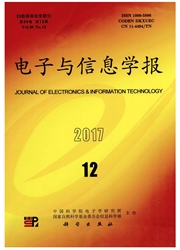

 中文摘要:
中文摘要:
在主动频谱切换中,预先确定目标信道存在高失效风险,从而增加切换时延的问题。该文提出一种基于混合主被动频谱切换的最优目标信道选择算法。该算法结合主动频谱切换和被动频谱切换的优点,引入最小累积切换时延评价标准,综合考虑次用户的多次中断、主用户的到达率和非理想频谱检测对次用户累积切换时延的影响,并详细分析和推导了非理想检测下次用户的累积切换时延。仿真表明,相较于主动和被动频谱切换中目标信道选择策略,在信道状态变化频繁或业务量较大等极端情况下,该算法的性能优势尤为明显。
 英文摘要:
英文摘要:
The predetermined target channel has high risk of being unavailable in the proactive-decision spectrum handoff. To solve this problem, an optimum target channel selection algorithm based on hybrid spectrum handoff is proposed. This algorithm coordinates the advantages of both the proactive-decision and reaztive-decision spectrum handoffs. With the metric of minimizing the cumulative handoff delay, the impacts of secondary user's multiple interruptions, primary user's arrival rates and imperfect sensing on secondary user's cumulative handoff delay are included and the detailed analysis and derivation of the secondary user's cumulative handoff delay are conducted under imperfect sensing. Compared with proactive-decision and reactive-decision target channel selection schemes, the simulation results demonstrate that the performance of the proposed algorithm is especially excellent with frequent channel states variations or heavy traffic loads.
 同期刊论文项目
同期刊论文项目
 同项目期刊论文
同项目期刊论文
 期刊信息
期刊信息
